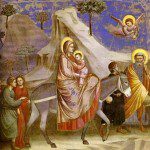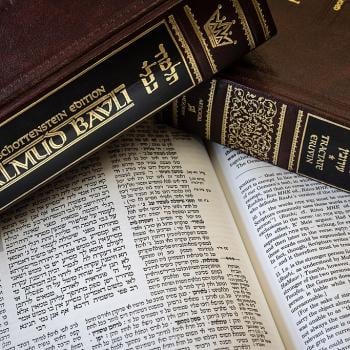![[Public domain], via Wikimedia Commons Memento Mori mosaic from excavations in the convent of San Gregorio, Via Appia, Rome, Italy. Now in the National Museum, Rome, Italy. The Greek motto gnōthi sauton (know thyself, nosce te ipsum) combines with the image to convey the famous warning: Respice post te; hominem te esse memento; memento mori. (Look behind; remember that you are mortal; remember death.)](https://wp-media.patheos.com/blogs/sites/637/2016/04/Roman-mosaic-know-thyself-300x197.jpg)
Memento Mori mosaic from excavations in the convent of San Gregorio, Via Appia, Rome, Italy. Now in the National Museum, Rome, Italy. The Greek motto gnōthi sauton (know thyself, nosce te ipsum) combines with the image to convey the famous warning: Respice post te; hominem te esse memento; memento mori. (Look behind; remember that you are mortal; remember death.)
When we forget who we are, we are easily led astray by our thoughts and opinions, making more of them than we should. We end up believing and trusting in ourselves beyond what is reasonable or just. We ignore how easy it is for us, with our limited experience and studies, to miss something of the truth and fall into grave error.[1] In and through our pride, we end up ignorant, closing ourselves off from all the truth which counters our false beliefs. Not only does it show that we do not know who and what we are, we end up believing in a false, delusional notion of ourselves. And that falsely constructed self ends up being used to construct a world of falsely constructed objects, a false universe, to place around it, where we in practice, if not in thought, end up placing ourselves at the center of our universe.[2] Such practice, when not halted, ends up leading to our unjust imposition on others, where we try to make the people of the real world play things we use to populate our not so brave new world.[3]
Spiritual delusion, prelest, comes easily when we put too much trust in ourselves. If we do not stop it, we begin to confuse our very thoughts as being inspired by God and so to be left unexamined or unquestioned. We are to test every spirit (cf. 1 John 4:1), and we should start such testing with our own. We should not believe every idea which comes out of us is a pure and holy truth given to us through the guidance of the Holy Spirit, rather, we should be cautious and indeed, skeptical, letting our thoughts be judged until they are proven correct. We can conditionally believe in them, but we must never take them as the absolute truth, rendering a judgment over our thoughts which is not ours to give – for, we the book of Proverbs warns us, “All the ways of a man are pure in his own eyes, but the LORD weighs the spirit.” (Prov. 16:2 RSV).
Sadly, this is lost on so many, if not most of us. Just look at how many think they can read a text of Scripture and whatever they believe it means, it must mean, because they presume that the Holy Spirit is directing their thoughts and interpreting the text for them. They do not think there is any reason to test the spirit, to test their interpretation: they think it is right and true because God has directly spoken to them using their thoughts to produce within them right belief. And when confronted with evidence that this is not the case, they just ignore it, showing forth the power of delusion.[4]
We should admit that we can be, and are guided, by the teaching of others, indeed, how we learned how to read is not through the direct movement of God in us, but through men and women. How we learned to interpret and read texts came also from such teachers, not God. This is what St. Augustine made clear in his work, On Christian Doctrine:
For, as I am dealing with Christians who profess to understand the Scriptures without any directions from man (and if the fact be so, they boast of a real advantage, and one of no ordinary kind), they must surely grant that every one of us learned his own language by hearing it constantly from childhood, and that any other language we have learned—Greek, or Hebrew, or any of the rest—we have learned either in the same way, by hearing it spoken, or from a human teacher. Now, then, suppose we advise all our brethren not to teach their children any of these things, because on the outpouring of the Holy Spirit the apostles immediately began to speak the language of every race; and warn every one who has not had a like experience that he need not consider himself a Christian, or may at least doubt whether he has yet received the Holy Spirit? No, no; rather let us put away false pride and learn whatever can be learned from man; and let him who teaches another communicate what he has himself received without arrogance and without jealousy.[5]
Pride, once again, is at fault. We try to find excuses so as not to listen to anyone else, to think more of ourselves, and our abilities, than is justified. Only by opening up to one another in love can we transcend ourselves, and it is only in such transcendence can we properly look down at ourselves and know ourselves. For certainly it is good to share what we have come to believe and why, but love seeks to give in the spirit of love, to receive likewise the same gift of love from others, to take what they have come to know and experience, and work together to form one unified understanding which emerges from such love. It is only with such love that we end up following God in holiness. And how do we know when we are not acting out of love? When we show no mercy, as St. Ammonas indicated in his instructions to others: “Mercy with understanding gives birth to foresight and leads to love. But lack of mercy is a sign that there is no virtue in a person.”[6]
St. Antony the Great saw Arius as the great example of his day and age of someone whose pride and lack of charity got the best of him, causing him to error greatly on the nature of God. And the cause of Arius’s error lay with his inability to recognize his own limitations, to know himself:
For he who knows himself, knows God: and he who knows God, is worthy to worship Him as is right. My beloved in the Lord, know yourselves. For they who know themselves, know their time: and they who know their time, are able to stand firm, and not be moved about by divers tongues. For in regard to Arius, who has risen up in Alexandria, and spoke strange words about the Only-begotten, giving a beginning to Him who has no beginning, and an end to Him who is ineffable among men, and motion to Him who is without motion – if one man sins against another, they entreat God for him; but if a man sin against God, whom will they entreat for him (cf. 1 Sam 2:25). That man therefore has taken upon himself a great matter, and a wound incurable. For if such a one had known himself, his tongue would not have spoken that which he had no knowledge. But it is manifest that he did not know himself.[7]
Arius scandalized his neighbors because he first failed to understand himself. He put undue demands on others as he tried to prop himself up while he lowered the nature of the Logos to be a creature like unto himself. By scandalizing his neighbor he truly sinned against Christ, demonstrating the truth of Antony’s words when he said, “If we have gained our brother, we have gained God, but if we scandalise our brother, we have sinned against Christ.”[8] For when we close off our love, in the end, it is Christ we end up attacking (cf. Matt. 25:40). The more we do this, the more this will be apparent even in our thoughts and beliefs. And how can we love, when we close ourselves up in self-love, hide ourselves in ourselves, and think and believe all that happens within reveals the truth of God to us which we must then impose on others with force, when necessary?
We must know ourselves to know God. To know ourselves requires us to transcend ourselves by love, to know ourselves in and through love, by finding ourselves in union with others through love. May we truly be one in love, even as the Father, Son and Holy Spirit are one in love. By such union with others, we can truly then come to know ourselves in truth, because in and through them we get to know ourselves by their eyes of love. Only then, only when we are united to each other in the bond of love can we say we know ourselves, and only then does God truly reveal himself to us, so that we end up knowing him in the revelation of love. For as the Apostle John said, God is love, and to know God we must know love (cf. 1Jn. 4:7-27).
[1] No matter how well read and studied we are, no matter how extensive our lived experience is, there is far more we have not studied or experienced than we have. This is why, though both are important and helpful, whatever we have gained from them should not be seen as proof that we are smarter or wiser or more knowledgeable than we really are.
[2] We could start out humble, and realize this, but still end up prideful and ignorant if we listen too much to the praises of our friends. As the disciple of St. Antony, St. Ammonas, once warned, “Praise from people give birth to arrogance little by little. To love boasting chases away knowledge,” St. Ammonas, “About the Joy of the Soul of One Beginning to Serve God” in Useful Servanthood: A Study of Spiritual Formation in the Writings of Abba Ammonas. Bernadette McNarvy-Zak. translations by Nada Conic, Lawrence Morey, OSCO, and Richard Upsher Smith Jr. (Collegeville, MN: Cistercian Publications, 2010), 144.
[3] For as long as we try to create the world in our delusion, anything which confronts us in our error we end up fearing and hiding from instead of engaging and using to liberate us from our error.
[4] When I find myself talking about Scripture with those who think they can instantly know the meaning of the text, that the Holy Spirit is directly revealing it to them, I like to ask them to interpret Scripture in a language they do not know how to read; usually, but not always, I use the Greek texts of the New Testament to do this, quoting something like Luke 1:43: “καὶ πόθεν μοι τοῦτο ἵνα ἔλθῃ ἡ μήτηρ τοῦ Κυρίου μου πρὸς ἐμέ.” When they say they cannot read or understand the text, I point to them the Holy Spirit can, since the Holy Spirit worked with the author of the text (Luke) to put those words down – the Holy Spirit would have no difficulty interpreting the text and if their thoughts came from the Holy Spirit, then their inability to read Greek would not matter. The end result is to state that they are confusing their own thoughts for the voice of God. Those so caught up in their delusion ignore this refutation, showing there is not much use in arguing with them. All I can do is show them love and pray that God will enlighten them one day.
[5] St. Augustine, “On Christian Doctrine” in NPNF1(2): 520.
[6] St. Ammonas, “About the Joy of the Soul of One Beginning to Serve God,”144.
[7] St. Antony the Great, “Letter IV” in The Letters of Saint Antony the Great. trans. Derwas J. Chitty (Fairaacres, Oxford: SLG Press, 1991), 12 -13.
[8] The Sayings of the Desert Fathers. trans. Benedicta Ward (Kalamazoo, MI: Cistercian Publications, 1984), 3.
Stay in touch! Like A Little Bit of Nothing on Facebook:
A Little Bit of Nothing












